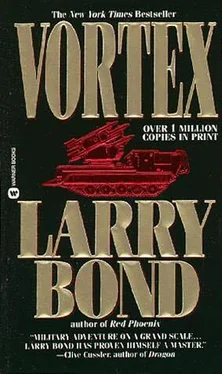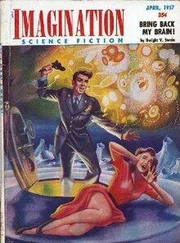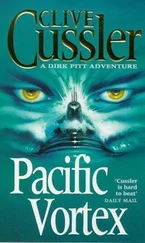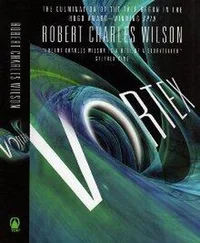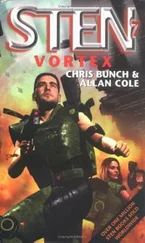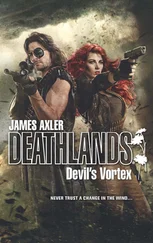He crouched by an open window, trying to spot a reasonably safe route to the battalion command bunker. He wasn’t having much luck. The bunker lay more than two hundred and fifty meters away across a flat, open field.
Perhaps it would be more sensible to carry out his duties from the barracks, van Daalen thought. After all, there wasn’t much point in dying in a quixotic and suicidal dash through machinegun fire.
Movement outside caught his eye. Soldiers, silhouetted against a burning
SAM launcher, were fanning out into a long line less than fifty meters away. As each man reached his place, he dropped prone facing the barracks.
Van Daalen rose. That was damned strange. It was almost as though those troops were planning to attack…
“Let the bastards have it! Fire! Fire! Fire!” The shout from outside echoed above the staccato rattle of gunfire and the crash of explosions all across Pelindaba.
Van Daalen froze in horror. That shout had been in English, not
Afrikaans. He started to turn…
Half a dozen rockets lanced out from the line of enemy troops, tore through thin wood walls, and exploded inside spraying fragments and wood splinters through the tightly packed South African soldiers. Machinegun and M16 fire scythed into the building right behind the rockets, punching through from end to end. Dead or wounded men were thrown
everywhere-tossed across bloodstained bunks or knocked into writhing heaps on top of one another.
Capt. Edouard van Daalen clutched at the jagged edges of what had once been a window frame in a vain effort to stay standing. Then his knees buckled and he slid slowly to the floor, pawing feebly at the row of ragged, wet holes torn in his chemical protection suit.
The Americans outside kept shooting.
HEADQUARTERS COMPANY, 1/75TH RANGERS
Lt. Col. Robert O’Connell listened with growing satisfaction to the reports flooding in from units around the compound. The enemy’s Cactus SAM battery permanently out of action. Barracks after barracks reported on fire or collapsed by salvos of light antitank rockets, HE rounds from recoilless rifles, and concentrated small-arms fire. A 120mm mortar position overrun at bayonet point by survivors from Bravo Company’s I st
Platoon. Brave Fortune was finally starting to go according to plan.
But the battalion’s casualties were heavy and growing heavier with every passing minute. Colonel Gener hadn’t been seen since the jump. Three of eight platoon leaders were down. He didn’t even want to guess how many noncoms and other Rangers lay dead in Pelindaba’s barbed wire, rock gardens, buildings, and open fields.
He ducked as a grenade burst close by, showering dirt and fragments across the open lip of the slit trench. A Ranger beside him screamed and fell back in a tangle of thrashing arms and legs. Blood spattered across
O’Connell’s face. Other soldiers were already up and shooting back-pumping rounds into the flame-lit darkness.
” Medic I “
Rangers dragged the wounded man farther down the trench to where the 1/75this senior medic had set up an impromptu aid station for the headquarters company. It was already overflowing with badly wounded men.
O’Connell spat out the salty, coppery taste in his mouth and grabbed the handset from his radioman. They had to move. It was time to go after the first of Brave Fortune’s two key objectives.
“Bravo Two One and Charlie Two
One, this is Rover One One. Execute Thor and Erector Set.”
2ND PLATOON, BRAVO COMPANY, 1/75TH RANGERS, NEAR THE POWER PLANT
Pelindaba’s small coal-fired steam plant had been built to a simple design that stressed function over pleasing form. Turning coal-heated boiler water to high-pressure steam-steam used to drive turbines generating electricity.
In turn, that electricity powered the uranium enrichment plant, science labs, and every other building inside the compound’s barbed wire fence.
One hundred yards south of the power plant, two Rangers lay flat in an open field. Their sergeant’s bullet-riddled body sprawled bloody and unmoving behind them.
Cpl. Mitch Wojcik squinted through the recoilless rifle’s nightvision sight. Piping of various thicknesses girded the outside of the plant, carrying feed water into its boiler, steam out to propel its spinning turbines, and steam cooling and condensing into water back again to the boiler. One tall stack carried away the smoke produced by burning high-sulfur soft coal.
Wojcik swung the Carl Gustav slightly to the right, seeking his target.
Bingo. Hours spent studying every available photo of the power plant paid off.
“Load HEAT.”
His loader slid a seven-pound high-explosive antitank round into the breech and slapped him lightly on the helmet.
“Up!”
Wojcik squeezed the trigger.
Whanng! The HEAT round slammed into a jumble of piping and exploded-peeling open thick, insulated pipes as though they were tinfoil. One was the conduit carrying feed water into the boiler. Superheated water and steam sprayed
out through the torn edges of a rapidly growing hole. With their lifeblood pouring out into the atmosphere, the power plant’s boiler and turbines ran dry in seconds.
Pelindaba’s primary electric power source went dead.
2ND PLATOON, CHARLIE COMPANY, 1/75TH
RANGERS, NEAR THE PELINDABA POWER SUBSTATION
Steel transmission towers spaced three hundred meters apart carried thirteen-kilovolt power lines connecting the Northern Transvaal-Pretoria electric grid to Pelindaba. One of the thirty-meter-high towers stood just across a road running between the nuclear weapons storage bunkers and the rest of the complex. Rows of canvas-sided trucks and civilian automobiles filled a parking lot on the other side of the road. Several were already ablaze-set on fire by tracer rounds buzzing through the complex.
“Christ!” Second Lieutenant Frank Miller threw himself flat as another burst of machinegun fire cracked over his head and slammed into the steel tower. Sparks cascaded down onto his Kevlar helmet. He looked back over his shoulder toward what was left of his first rifle squad-five men, one carrying a squad automatic weapon. The rest were dead or dying, strewn across the drop zone and the road.
“Hernandez, gimme some covering fire, goddammit!”
The squad automatic weapon cut loose again, spewing steel-jacketed rounds into the darkness. M16-armed Rangers joined in, trying to pin down the
South African infantry occupying a bunker one hundred meters away. The odds of actually hitting any of the enemy troops were vanishingly small, but enough bullets spanging off the bunker’s concrete walls might make the South Africans flinch away from their firing slits. One of the
Rangers threw another smoke grenade upwind.
Miller got to his knees and looked at his handiwork. He needed one more demolition charge in just the right place. He held out his hand.
“More
C4, Steve.”
No response.
The Ranger officer frowned and turned around. Corporal Lewis lay flat on his back, with his arms thrown out wide and a gaping hole where his forehead used to be. Miller swallowed hard and pried the last charge of plastic explosive out of the dead man’s right hand.
Working fast now, almost in rhythm with the sound of the firing behind him, he molded the C4 onto one of the steel supports steadying the power pylon and stuck a line of detonator cord into it. Satisfied, he crawled away, unreeling detcord as he went.
A shallow drainage ditch running beside the road offered the only piece of real cover for more than a hundred meters. Miller calculated distances and angles and swore viciously. He was well inside the minimum safe distance for setting off the C4, but he didn’t have time to crawl farther. He glanced over the edge of the drainage ditch. Flashes showed where Hernandez and his men were still firing toward the South African bunker.
Читать дальше
